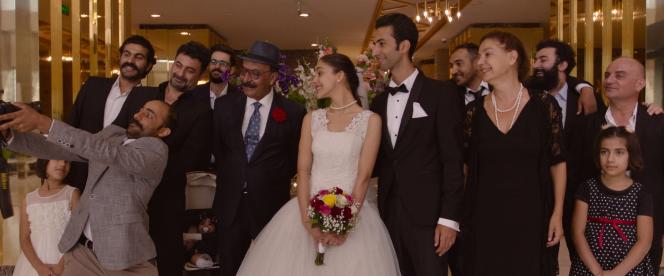In a village in Iraqi Kurdistan, while the news broadcast on the radio announces a retreat of the Islamic State (IS) organization on all the front lines, another war is raging, this one less deadly, but very tough, to the point of seeming unbreakable. In the battle, only two belligerents, Resul (Barzan Shaswar) and Shero (Bekir Ma’rof), good guys moreover, but stubborn as donkeys, whose mutual hatred dates back to the dawn of time, nourished over the years by anecdotal neighborhood quarrels that the two lads took pleasure in cultivating.
Only, today, the matter is serious, which requires, in each camp, the greatest firmness. Resul and Shero having, this time, the mission of preventing the marriage between Avdal (son of the first) and Ziné (daughter of the second), whose most unfortunate idea, no doubt, was to fall madly in love one another.
Thus begins – in farce mode – Goodnight Soldier, the twelfth feature film by Kurdish filmmaker Hiner Saleem, who returns once again to his native country (left as a teenager) to tell us a love story with Shakespearean resonances. . A drama initially kept at a distance by funny scenes, but which gradually infiltrates the story with majesty and modesty, without noise or fury. Humor is always in ambush at Hiner Saalem. It provides him with a safeguard against seriousness and complacency in the face of misfortune.
The one who strikes the young peshmerga Avdal (Galyar Nerway) and the very beautiful Ziné (Dilîn Döger) picks up the lovers in full youth, at the culmination of a happiness they have barely tasted. Above all, it provokes a shock wave which will not only upset the balance of their respective families, but tend to question the established order of a society which, despite the revolution, is struggling to emancipate itself from the patriarchal laws and values. This misfortune produces a break in tone, opens a gap in contact with which the story is nuanced, the character of the characters is refined. The golden light then gives way to twilight chiaroscuros, gravity draws the faces differently, the frame tightens on the bodies, once full of momentum, now impeded.
Women’s place
Because, despite the opposition of their parents and their brothers, Avdal and Ziné ended up, by dint of obstinacy and thanks to the intervention of a third party, by winning their case. Reconciled, the two clans worked on the preparations for the wedding, with fervor and all the more emotion as the young Avdal, who had returned injured from his last fight against the soldiers of the IS, almost died. The village paid tribute to his heroism, the wedding took place, the newlyweds shared their first night together. which separated them. Avdal having proved powerless preferred to flee. Devastated and in disbelief, Ziné returned to her parents. The time of recklessness has come to an end.
Everything remains to be built. First of all, the interrupted love story that the two young lovers choose to build, despite the obstacles, the hostile opinion and the condescending looks of the men around them. The impotence that reached Avdal – due to the surgery he underwent after his injury – is irreversible. The couple cannot have children.
It is from this wound that the film builds its subject, questions the notion of virility, the importance it has in the Middle East and more broadly in our societies. But also the evolution of the place of women, the path traveled in this area by young people, the reluctance that persists among previous generations. But not only. Even though Avdal has freed himself from cultural and religious traditions, some of them still confuse his judgment and, spontaneously, oppose certain initiatives – in particular that of wanting to work – taken by his young wife.
Born in the electric impatience of desire, love enters into resistance and holds up the mirror to this part of the world on which it tries to appease itself. Hiner Saleem keeps his frame tight on the lovers, does not let go, cutting out the faces against the light, separating the bodies through the glass and the veiling of the windows, or uniting them without the slightest shyness. This impeded passion that the director films, between shadow and light, does not always escape the conventional, slightly mannered image of melodrama. Fortunately, humor saves everything, and Hiner Saleem has a lot of repartee in this area.

















